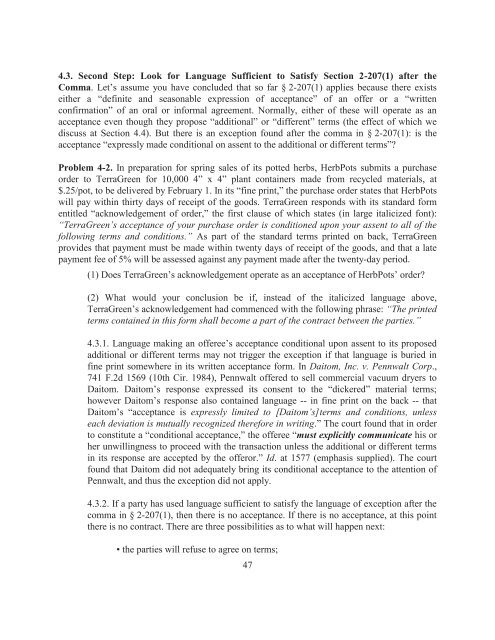Sales and Leases - A Problem-based Approach, 2016a
Sales and Leases - A Problem-based Approach, 2016a
Sales and Leases - A Problem-based Approach, 2016a
Create successful ePaper yourself
Turn your PDF publications into a flip-book with our unique Google optimized e-Paper software.
4.3. Second Step: Look for Language Sufficient to Satisfy Section 2-207(1) after the<br />
Comma. Let’s assume you have concluded that so far § 2-207(1) applies because there exists<br />
either a “definite <strong>and</strong> seasonable expression of acceptance” of an offer or a “written<br />
confirmation” of an oral or informal agreement. Normally, either of these will operate as an<br />
acceptance even though they propose “additional” or “different” terms (the effect of which we<br />
discuss at Section 4.4). But there is an exception found after the comma in § 2-207(1): is the<br />
acceptance “expressly made conditional on assent to the additional or different terms”?<br />
<strong>Problem</strong> 4-2. In preparation for spring sales of its potted herbs, HerbPots submits a purchase<br />
order to TerraGreen for 10,000 4” x 4” plant containers made from recycled materials, at<br />
$.25/pot, to be delivered by February 1. In its “fine print,” the purchase order states that HerbPots<br />
will pay within thirty days of receipt of the goods. TerraGreen responds with its st<strong>and</strong>ard form<br />
entitled “acknowledgement of order,” the first clause of which states (in large italicized font):<br />
“TerraGreen’s acceptance of your purchase order is conditioned upon your assent to all of the<br />
following terms <strong>and</strong> conditions.” As part of the st<strong>and</strong>ard terms printed on back, TerraGreen<br />
provides that payment must be made within twenty days of receipt of the goods, <strong>and</strong> that a late<br />
payment fee of 5% will be assessed against any payment made after the twenty-day period.<br />
(1) Does TerraGreen’s acknowledgement operate as an acceptance of HerbPots’ order?<br />
(2) What would your conclusion be if, instead of the italicized language above,<br />
TerraGreen’s acknowledgement had commenced with the following phrase: “The printed<br />
terms contained in this form shall become a part of the contract between the parties.”<br />
4.3.1. Language making an offeree’s acceptance conditional upon assent to its proposed<br />
additional or different terms may not trigger the exception if that language is buried in<br />
fine print somewhere in its written acceptance form. In Daitom, Inc. v. Pennwalt Corp.,<br />
741 F.2d 1569 (10th Cir. 1984), Pennwalt offered to sell commercial vacuum dryers to<br />
Daitom. Daitom’s response expressed its consent to the “dickered” material terms;<br />
however Daitom’s response also contained language -- in fine print on the back -- that<br />
Daitom’s “acceptance is expressly limited to [Daitom’s]terms <strong>and</strong> conditions, unless<br />
each deviation is mutually recognized therefore in writing.” The court found that in order<br />
to constitute a “conditional acceptance,” the offeree “must explicitly communicate his or<br />
her unwillingness to proceed with the transaction unless the additional or different terms<br />
in its response are accepted by the offeror.” Id. at 1577 (emphasis supplied). The court<br />
found that Daitom did not adequately bring its conditional acceptance to the attention of<br />
Pennwalt, <strong>and</strong> thus the exception did not apply.<br />
4.3.2. If a party has used language sufficient to satisfy the language of exception after the<br />
comma in § 2-207(1), then there is no acceptance. If there is no acceptance, at this point<br />
there is no contract. There are three possibilities as to what will happen next:<br />
• the parties will refuse to agree on terms;<br />
47


















